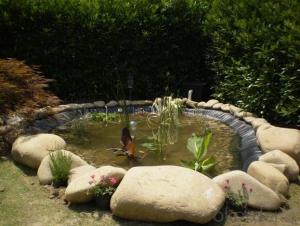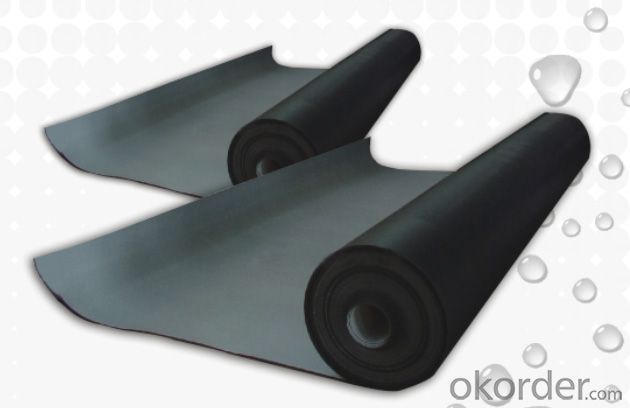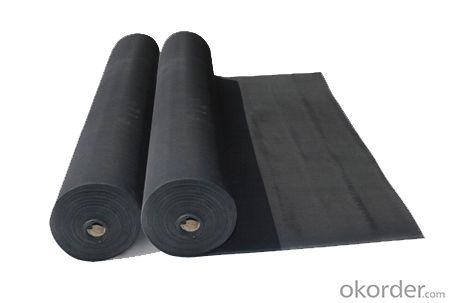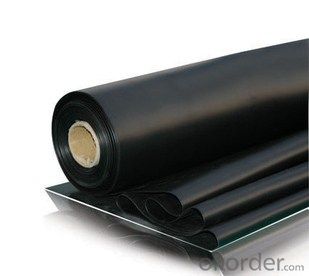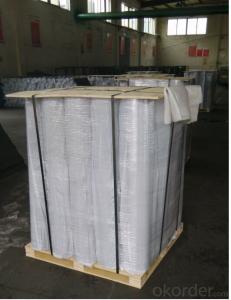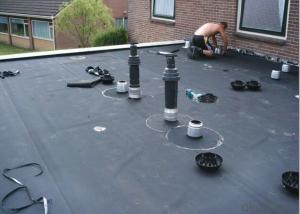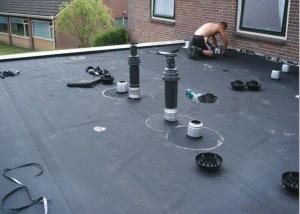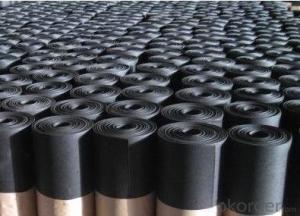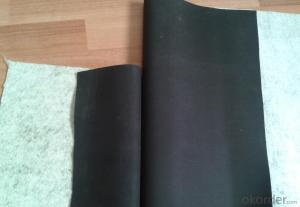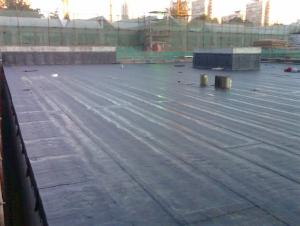EPDM Coiled Waterproof Membrane with Customized Thickness
- Loading Port:
- Shanghai
- Payment Terms:
- TT OR LC
- Min Order Qty:
- 50000 m²
- Supply Capability:
- 5000000 m²/month
OKorder Service Pledge
OKorder Financial Service
You Might Also Like
EPDM Coiled Waterproof Membrane with Customized Thickness
Description Of EPDM Coiled Waterproof Membrane with Customized Thickness:
1. Excellent physical and mechanical performance, high tearing resistance;good deformation adaptability, high puncture resistance;
2. High aging resistance, high UV resistance, anti-acid & alkali;
3. Excellent low & high temperature resistance, innocuous, long life span;
4. Perfect water proof performance, seepage and humidity resistance.
Main Features of EPDM Coiled Waterproof Membrane with Customized Thickness:
A.Polyester based SBS Modified Bitumen Waterproofing Membrane
a. Strong impermeability
b. High tensile strength, elongation, ability to adapt the grassroots shrinkage deformation and cracking
c. Puncture-resistant, broken resistant, tear-resistant
d. The corrosion resistance, resistance to mildew, weathering good
e. Construction convenient, hot-melt can be operated Four Seasons Construction, reliable joints
B. Fiberglass based SBS Modified Bitumen Waterproofing Membrane
a. High tensile strength, stability of a good size
b. High Temperature good performance
c. Damage resistance, corrosion resistance, resistance to mildew, weathering good performance
d. Good construction performance, reliable joints.
Specifications of EPDM Coiled Waterproof Membrane with Customized Thickness:
| Material | EPDM Rubber |
| Size | 1.2m (width)*20m (length) or customized, weldable type 2.05m or 4m width |
| Thick | 1.2mm, 1.5mm, 2.0mm |
| Type | Vulcanized & Weldable |
| Pattern | Non-reinforced (homogeneous) |
| Certificate | ISO9001/14001 |
Applications of EPDM Coiled Waterproof Membrane with Customized Thickness:
geomembrane used in groundsill of road, highway, railway and waterproof layer of swelling clay and wet collapsed loess.Geomembrane can be widely used in areas of garbage burying, waste disposal and underground construction projects.such as below:
- aquaculture ponds
- Ouchi root barrier membrane
- Floating baffles;
- Process wastewater
- Stormwater impoundments;
- Secondary containment;
- Spill containment
- Manure and biogas tanks and covers
- Potable water tanks and covers;
- Sludge Drying beds;
- Bioremediation covers & liners;
- Leachate ponds
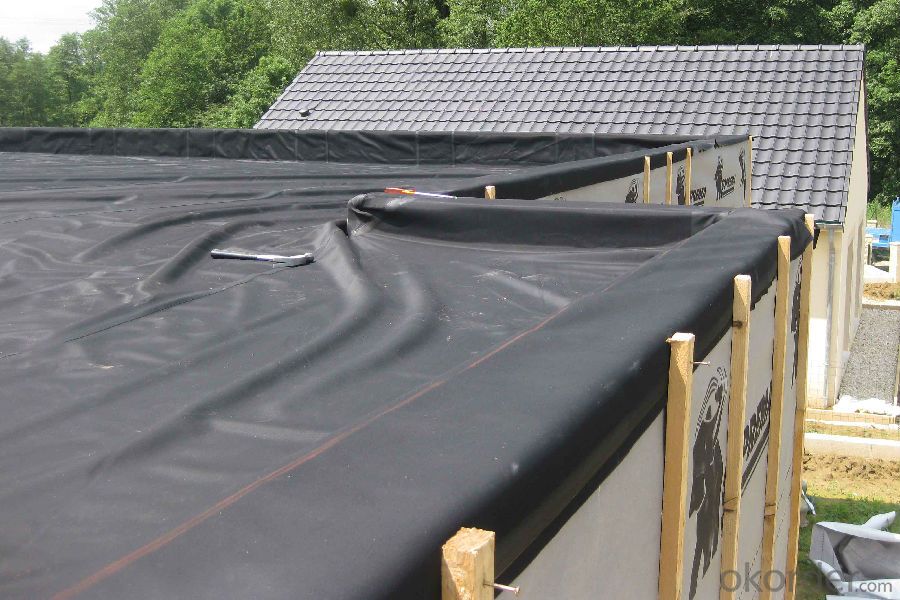
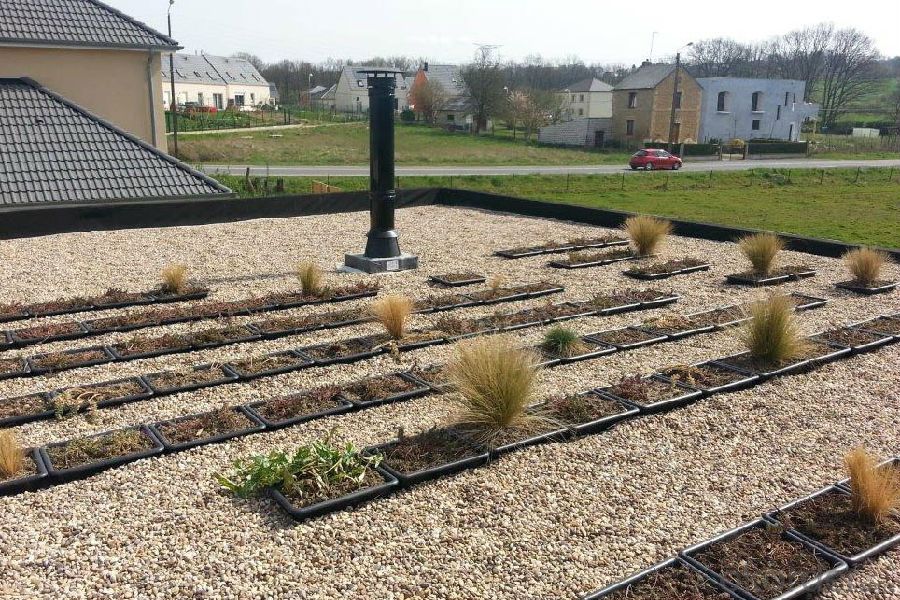
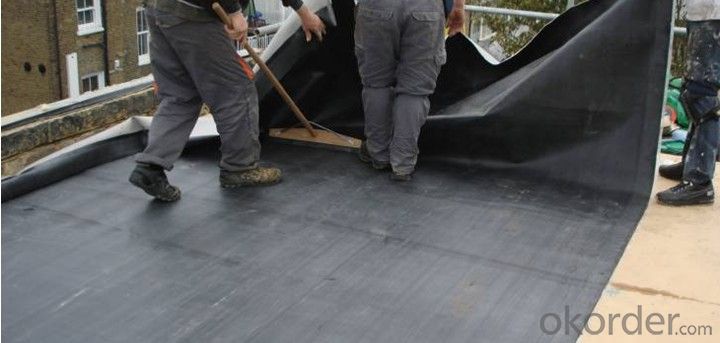
IMages of EPDM Coiled Waterproof Membrane with Customized Thickness:
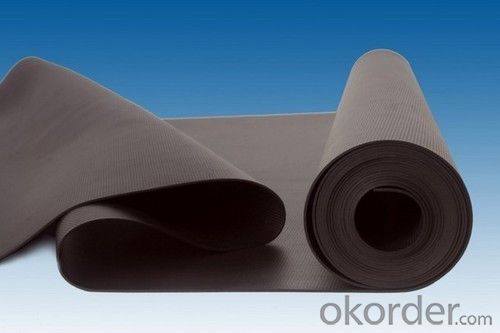
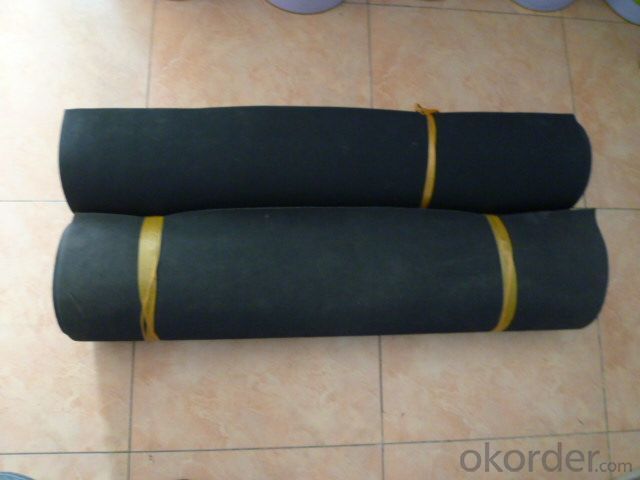
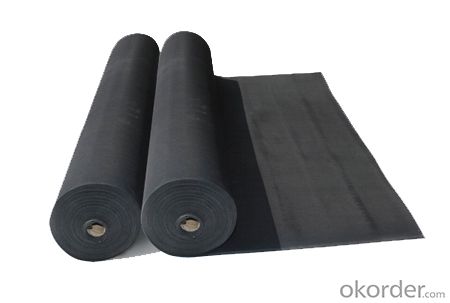
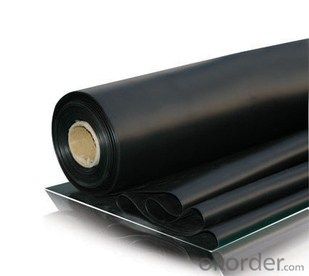
FAQ of EPDM Coiled Waterproof Membrane with Customized Thickness:
1. What are we supplying?
We are specialized in producing Colorful Asphalt Roof Shingle, SBS/APP modified bitumen waterproof membrane, Self adhesive bitumen waterproof membrane, PVC waterproofing membrane, EPDM rubber roofing membrane, Single Component Polyurethane Waterproof Coating, and Spray Polyurea Waterproof Coating
.
2. How Many years experience do we have?
We have been exported to more than 20 countries in the past 15 years.
3. How long do we usually reply your request?
We always reply our customer within 24 hours.
- Q: Can a waterproofing membrane be used for shopping malls or commercial buildings?
- Yes, a waterproofing membrane can be used for shopping malls or commercial buildings. Waterproofing membranes are commonly used in construction to protect the structure from water damage. They are specifically designed to create a barrier against water infiltration, preventing leaks and moisture buildup. By applying a waterproofing membrane to the building's exterior, it helps to ensure the longevity and durability of the structure. Shopping malls and commercial buildings often have large surface areas that are exposed to different weather conditions, making them susceptible to water damage. Therefore, using a waterproofing membrane is an effective solution to protect these buildings and maintain their structural integrity.
- Q: Can a waterproofing membrane be used in coastal areas?
- Yes, a waterproofing membrane can be used in coastal areas. Coastal areas are prone to high levels of moisture and water exposure, making it essential to have effective waterproofing measures in place. A waterproofing membrane, when properly installed and maintained, can provide a protective barrier against water intrusion, preventing damage to structures and ensuring their durability. However, it is important to select a membrane that is specifically designed for coastal environments, as these membranes are typically more resistant to saltwater and have enhanced durability to withstand the harsh coastal conditions. Additionally, regular inspection and maintenance should be carried out to ensure the effectiveness of the waterproofing membrane in coastal areas.
- Q: Can a waterproofing membrane be used in areas with high foot traffic or heavy loads?
- Yes, a waterproofing membrane can be used in areas with high foot traffic or heavy loads. Waterproofing membranes are designed to provide a protective barrier against water infiltration and can withstand various types of stress, including foot traffic and heavy loads. However, it is important to choose a waterproofing membrane that is specifically designed for these conditions. There are different types of membranes available, each with varying levels of durability and strength. It is crucial to consult with a professional waterproofing expert or manufacturer to ensure that the chosen membrane is suitable for the specific requirements of the area with high foot traffic or heavy loads. Proper installation and maintenance of the membrane are also essential for its long-term effectiveness in these conditions.
- Q: Can a waterproofing membrane be applied to horizontal surfaces?
- Horizontal surfaces can indeed have a waterproofing membrane applied to them. In fact, it is quite common to utilize this method in order to safeguard and waterproof flat areas like roofs, decks, balconies, and the like. The membrane functions as a protective barrier, effectively preventing water from infiltrating the surface and causing harm. Typically, this membrane is crafted from a pliable material, such as rubber or modified bitumen, which easily conforms to the contours of the horizontal surface. Moreover, the membrane is specifically engineered to withstand foot traffic and other forms of weight, ensuring long-lasting protection. All in all, the application of a waterproofing membrane to horizontal surfaces proves to be a highly effective means of preventing water damage and prolonging the lifespan of the surface.
- Q: Can waterproofing membranes be used on outdoor patios?
- Yes, waterproofing membranes can be used on outdoor patios. They are an effective way to protect the patio from water damage and can help to prevent leaks and moisture penetration. Waterproofing membranes create a barrier between the patio surface and water, keeping it dry and extending its lifespan.
- Q: Are waterproofing membranes resistant to chlorine exposure?
- Waterproofing membranes can vary in their resistance to chlorine exposure. Some membranes are specifically designed to be resistant to chlorine and are commonly used in applications where chlorine exposure is expected, such as pool decks or water treatment facilities. These membranes are typically made with materials like PVC or TPO that have inherent resistance to chlorine and can withstand prolonged exposure without significant degradation. However, it is important to note that not all waterproofing membranes are chlorine-resistant. Some membranes, particularly those made with materials like EPDM or bitumen, may not be as resistant to chlorine and may experience deterioration or damage when exposed to chlorine for extended periods. To ensure the longevity and effectiveness of a waterproofing membrane in a chlorine-rich environment, it is crucial to select a membrane that is specifically designed and tested for chlorine resistance. Consulting with a waterproofing professional or manufacturer can help determine the most suitable membrane for the specific chlorine exposure conditions.
- Q: Can a waterproofing membrane be used for planter boxes?
- Indeed, planter boxes can benefit from the utilization of a waterproofing membrane. The main purpose of a waterproofing membrane is to obstruct the passage of water through various surfaces, making it an effective remedy for safeguarding the planter box and its surroundings against water damage. When a waterproofing membrane is installed internally within the planter box, it establishes a protective barrier that prevents water from infiltrating the underlying materials, such as wood or concrete, thus prolonging the lifespan of the planter box. Furthermore, the presence of a waterproofing membrane can also assist in retaining moisture within the planter box, which proves advantageous for the plants thriving inside. Nonetheless, it is crucial to exercise caution when selecting a waterproofing membrane, ensuring that it is specifically tailored for planter boxes and poses no harm to the plants, thereby guaranteeing optimal outcomes.
- Q: Can a waterproofing membrane be used on aluminum surfaces?
- Yes, a waterproofing membrane can be used on aluminum surfaces.
- Q: Can a waterproofing membrane be used for plant rooms and mechanical equipment areas?
- Plant rooms and mechanical equipment areas can benefit from the use of a waterproofing membrane. It is necessary to waterproof these areas in order to safeguard the equipment and surrounding structures against water damage. A waterproofing membrane serves as a commonly implemented solution for this purpose. By forming a barrier, it effectively prevents water infiltration into the plant rooms and mechanical equipment areas, thereby ensuring the equipment remains dry and protected. Moreover, this membrane aids in averting moisture-related problems like the growth of mold and mildew, which can be detrimental to both the equipment's functionality and the overall operation of the plant room. Ultimately, incorporating a waterproofing membrane in plant rooms and mechanical equipment areas proves to be a dependable and efficacious approach for maintaining the longevity and performance of the equipment and structures.
- Q: Can a waterproofing membrane be used for railways or train stations?
- Railways and train stations can certainly benefit from the use of waterproofing membranes. These membranes are widely employed in construction projects to safeguard structures from water damage and promote their longevity. In the case of railways and train stations, where they are constantly exposed to weather conditions and the possibility of water infiltration, waterproofing membranes play a vital role in preventing water from seeping into the infrastructure. Waterproofing membranes are typically applied to different areas of railways and train stations, including underground tunnels, platforms, parking areas, and even roofs. These membranes create a barrier that prevents water and moisture from penetrating the structure and causing harm. By averting water infiltration, waterproofing membranes help maintain the structural integrity of railways and train stations, ultimately prolonging their lifespan. In addition to water protection, these membranes offer other benefits such as inhibiting the growth of mold and mildew, enhancing energy efficiency by reducing heat loss, and improving overall durability. They come in various types, such as liquid-applied membranes, sheet membranes, and cementitious coatings, providing flexibility in application based on the specific requirements of the railway or train station project. All in all, it is highly recommended to utilize waterproofing membranes in railways and train stations to ensure their long-term performance and maintenance.
Send your message to us
EPDM Coiled Waterproof Membrane with Customized Thickness
- Loading Port:
- Shanghai
- Payment Terms:
- TT OR LC
- Min Order Qty:
- 50000 m²
- Supply Capability:
- 5000000 m²/month
OKorder Service Pledge
OKorder Financial Service
Similar products
Hot products
Hot Searches
Related keywords
